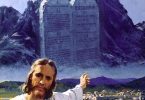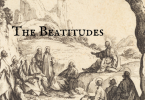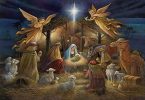2nd Sunday of Lent (Year B)
Scripture: Gen. 22: 1-2. 9-13, 15-18; Ps. 1115:10, 15-19; Rom. 8:31-34; Mk. 9:2-10
We have started our Lenten journey of forty days beginning from Ash Wednesday. Last Sunday’s liturgy reminded us that we need to walk this journey with God. Noah, in the Old Testament, was one of the few persons who walked with God. Jesus, the Son of God himself walked down on earth to heal the brokenhearted. The first week highlighted the aspect of walking with God is of the utmost importance when God himself decided to walk in our midst.
The second Sunday’s or today’s liturgy gives us yet another important lesson for our lives. it tells us that there will be hills and mountains in our journey of life and we need to climb them without any fear. It is simply trusting in the Lord that He is walking with us and every ‘mountain climbing’ experience will bring transformation in our lives. Someone had rightly said that the best view comes only after the hardest climb. Just starring at the mountain we will not be able to climb them but we need to start climbing. It is a harder process yet it gives a better view of the world.
The readings of today’s liturgy have a similar message for us. The first reading narrates the scene of Abraham taking his only son to the Mountain top to sacrifice him. It was the command of God that he must sacrifice his son Isaac. It must have been painful to get ready for Isaac’s sacrifice. We can imagine the state of Abraham. Isaac was Abraham’s long-awaited dream, born to Sarah. After Ismael was sent out at Sarah’s insistence (Gen. 21:10-11), Isaac was the only son of Abraham. He was their miracle baby because the couple (Abraham and Sarah) were advanced in age when they were blessed with Isaac. It must have been confusing when God had established a covenant with Abraham and his descendent (Genesis 17:19, 21; 21:12). It might have been an unbearable pain to sacrifice Isaac because the scriptures say, Isaac was his only son and he loved him. Abraham knew that there were no chances of getting another child. Ismael, his firstborn was already sent out. So Isaac was Abraham’s only hope and dream. He was his only future.
In spite of all the pain, anxiety and difficulties, Abraham decided to follow the command of God. He decided to climb the mountain, Moriah. Abraham started his journey the very next early morning. He took his servant, his only son and a donkey along with him. They travelled for three days from Beer-Sheba to Mt. Moriah (the present-day Jerusalem) in silence. It was a journey of about 50 miles. On Mt. Moriah, Abraham prepared himself to sacrifice his one and only son, Isaac. At the time of laying his hands to sacrifice his son, Abraham experienced the presence of God at that moment. He heard the voice of the angel. God revealed His marvellous plan to Abraham that He would receive blessings. He would multiply his descendants. His descendants would possess the land. Abraham could experience God’s mercy and abounding love only on the mountain. Abraham had a better view of God’s love on the mountain top.
The Gospel also depicts a mountain experience today. It is a scene of the transfiguration of Jesus Christ. Jesus took three of his disciples, Peter, John and James on the mountain top. It is interesting to note that the text begins with the phrase “Six days later, Jesus led these disciples (emphasis added) up a high mountain.” (Mk. 9:2). What had happened six days before the transfiguration in the Gospel of Mark? Jesus had predicted his passion, death and resurrection (Mk. 8:27-38). Jesus had questioned his disciples as to what do they think about him? Peter had confessed that Jesus was the messiah. On this response, Jesus had openly revealed to them that “the Son of Man had to suffer many things and be rejected by the elders, the chief priests and the teachers of the Law. He would be killed and after three days rise again.” (Mk. 8:31).
The passion and death of Jesus had a deep impact on his disciples. Peter completely denied it. He went to the extent of rebuking Jesus for his statement. It was difficult for the disciples to accept the passion and death of Jesus. He could not comprehend the idea of the resurrection. They wanted to see Jesus rising in his glory. In such a confusing state, Jesus gave three of his disciples a glimpse of his divinity. The dazzling clothes of Jesus, the presence of Moses and Elijah and the voice coming from the cloud foreshadow the heavenly glory of Jesus to them. The transfiguration experience at the mountain top refreshed their dejected life. They had a better view of Jesus on the mountain top.
The above two mountain top experience reveal to us that climbing up the mountain was difficult to experience for Abraham, Isaac and all the three disciples. But once on the mountain, they had a better view of life. As I have mentioned earlier, we are on this journey of life, we face a number of mountain climbing experiences. The journey becomes difficult; we lose hope; we feel like dropping the journey. We need to remember the saying of Barry Finlay, that every mountain is within our reach if we keep on climbing every day.
Jesus climbed with three of his disciples and gave them a glorious experience. Later on, Jesus had to become the new Isaac to prove the love of God, the Father. Jesus, like Isaac, was God’s beloved son who has been long-awaited and was born in miraculous circumstances (Gen. 22:1; Mt. 3:17). Like Isaac, Jesus too had to carry the wood on his back to the mountain top, on which He was crucified (Gen. 22:6; Jn. 19:17). Jesus was led by his Father and remained obedient like how Isaac was to Abraham (Gen. 22:3; Mt. 26:39). God provided a ram for Abraham to make the sacrifice in the place of Isaac (Gen 22:13) but did not spare Jesus who was slaughtered to save us (Jn. 1:29).
The crucifixion of Jesus Christ on Mt. Calvary has revealed to us the real love of God. This mountain experience which was the most agonising experience of Christ, this hardest climb has given us a better view of God’s marvellous love. May we climb the hardest mountains, to see the glory of God in our lives.






